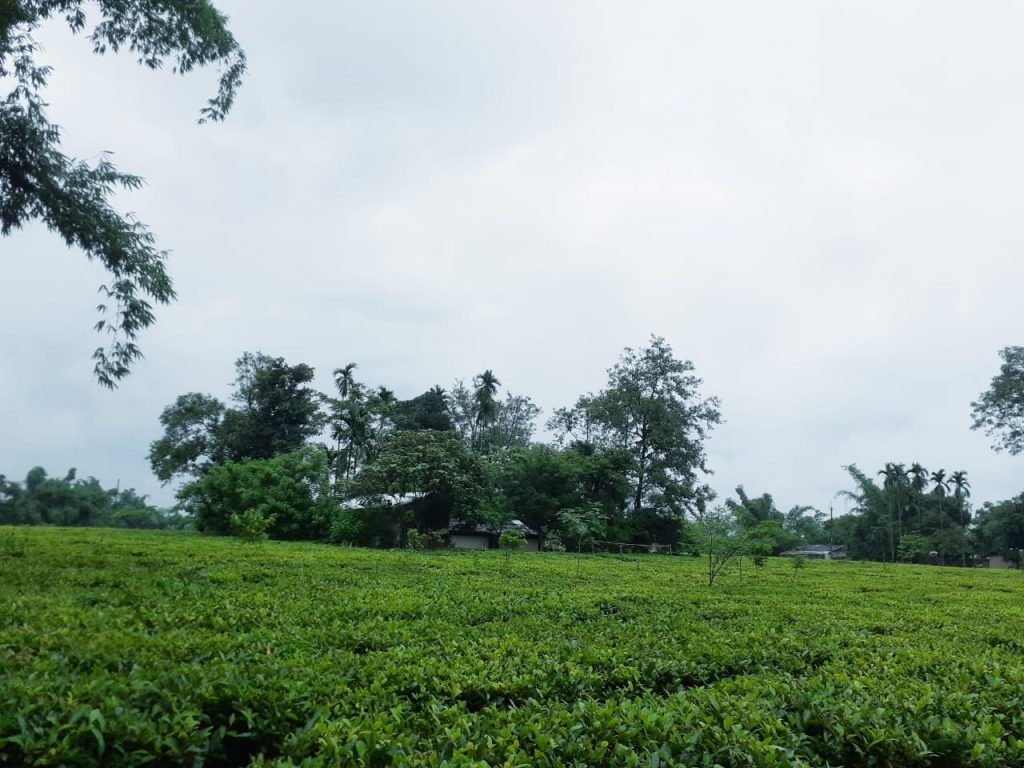
Tinsukia: Phillobari, a small village in the Tinsukia district of Assam, located on the Assam-Arunachal Pradesh border was well known for its sugarcane cultivation, untill the villagers decided to turn to tea plantations in the late 1970s.
Tinsukia district was once known as the Molasses capital of Assam. But as tea plantations flourished, and with the government offered support to the tea gardens, the once sugarcane-rich lands were gradually converted into tea gardens. So much so that today almost every household of the Phillobari village has converted its backyard into tea gardens, replacing the traditional ‘bari’ or the kitchen garden.
Phillobari is located on the southeast side of Tinsukia, about 522 kilometers east of the capital city of Guwahati. It the past four decades the village is seen a complete economic transformation with almost all households now owning a small tea garden in its backyard.
As per Ashish Oja, a resident of the village, Harakanta Mahanta and Premeshwar Mahanta were the pioneers of Phillobari planting tea, back in 1979. “In 1978 a movement kicked off when former agriculture and cooperation minister Soneswar Bora encouraged the Assamese people to take up tea plantations in their homesteads and at the fallow lands at their disposal. Today the village is surrounded on all sides by lush tea plantations and forests,” he said.
Today almost 95 percent of the households in Phillobari are tea growers. Of the 40,000 odd small tea growers in the district, the highest any district has in Assam, 6000 belong to this area.
“Tea cultivation ushered in 'total happiness' to Phillobari. It is like the 'Darjeeling of Assam' as thousands of acres of land are now under cultivation of tea. The fertile soil is ideal for quality tea production with the necessary help from the government. With stringent law and order in place, there have been no external disturbances in recent years, especially from the insurgency. The electricity supply has also been regularised, which has made cultivation possible in the past few years without a break,” said Ram Das, a small tea grower in the village.

Tinsukia district was once known for insurgency and was the hotbed of ULFA in the 1990s. But with tea cultivation becoming an occupation for almost everybody, many of them became small tea cultivators and led a decent life. "The motivation towards tea cultivation forced many to leave the militant outfit," said another planter, Kongkonjyoti Goswami, a community mobilizer with Trinitea which is a small tea growers’ project in Assam.
Goswami said that the village has drastically progressed compared to the 1990s when there were neither good roads and not enough work for the villagers due to the prevalence of insurgent activities.
"It is true that there has been prosperity in Phillobari, thanks to tea. It has stopped the migration of laborers too," says Dhiraj, a local social worker.
"Tea cultivation has changed the face of Phillobari. Every family in the village now owns at least one vehicle, be it a two-wheeler or a four-wheeler. It would not be wrong to say that small tea growers have contributed a lot to the economy of the area,” added Goswami.
Although the village economy has prospered in the past decades, these small tea planters are often forced to sell their products at minimum prices to save further damage from calamities. The annual floods often leave most plantations submerged under water, thus damaging the plants.
“We need more support from the government. Destruction of the gardens due to rainfall is a major concern. Most farmers are often forced to sell their produce at low rates,” said Das.
The Tea Board India (TBI) is also supporting the tea cultivators.
"One has to spend up to one and a half lakh rupees per acre in order to start tea cultivation. And it takes about three years for the tea bush to start yielding. It is by the fifth year of cultivation that the farmer can recover his investment, and only in the eighth year of the plantation does the farmer make any profit. So, encouragement is expected from the government," he added.
There are an estimated 1.50 lakh small tea growers in Assam now cultivating tea in an area of 1,05,291 hectares. Small tea growers have emerged as an important sector contributing significantly to the country’s production of made tea.
The NITI Aayog's report of 2021 stated that as per the percentage of the population who are multi-dimensionally poor, Assam ranked 5th in the country, with at least 32.67 percent of its population multi-dimensionally poor. However, tea has brought some prosperity to the region and provided employment to many.